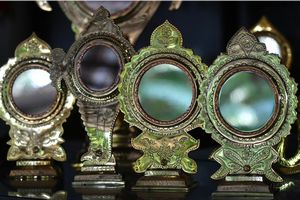Secrets and mirrors
A distance away from Thiruvananthapuram, the capital of Kerala lies the picturesque town of Aranmula. It is a temple town located on the banks of the Pamapa and boasts of the Parthasarathy Temple, one of the venerated 108 Vaishnava temples.
According to legend, the King of Pandalam brought artisans from Sankaran Koil near Tirunelveli to Aranmula to build the Parthasarathy Temple. These skilled craftsmen, while casting copper-based alloys, discovered the reflective property of a particular copper-tin alloy. Thus began the tradition of making the Aranmula kannadi.
What is extraordinary about this mirror is that it is handmade and unlike the usual glass mirror it eliminates secondary reflections that you typically see in back surface mirrors.

There are three kinds of mirrors – the back stand, the fixed stand and the hand mirror. The process of making the mirror usually involves two stages. The first involves the mould being prepared, based on the shape the mirror will take. To prepare this mould the craftsmen melt all the metals – the names of the metals and the composition are known only to the craftsmen – is referred to as the Vishwakarma family secret. Eighty mirrors can be made from one mould.
In the second stage, the metal is polished, and this process takes weeks on end to attain the perfect finish and to achieve the mirror’s reflective surface. It is a long and laborious task. Once done, the mirror is set in elegant ornamental frames.
These mirrors can never be duplicated as the intricacies of making them is known only to the family members who craft them. It is believed that a woman belonging to one of the artisan’s family had a dream in which the formula to making this alloy was revealed to her.
Today this mirror is considered an auspicious item and is part of the eight auspicious articles – Ashtamangalya set – usually displayed at religious ceremonies, functions and weddings.
In 2004, this rare craft was given international recognition and awarded a geographical indication (GI) tag. A 45-cm tall mirror was placed in London’s British Museum. The religious significance and the rarity of the kannadi prompted Kerala Tourism to declare Aranmula a heritage village.
Once you have read this story try your hand at this word search puzzle. All the words are from this story.